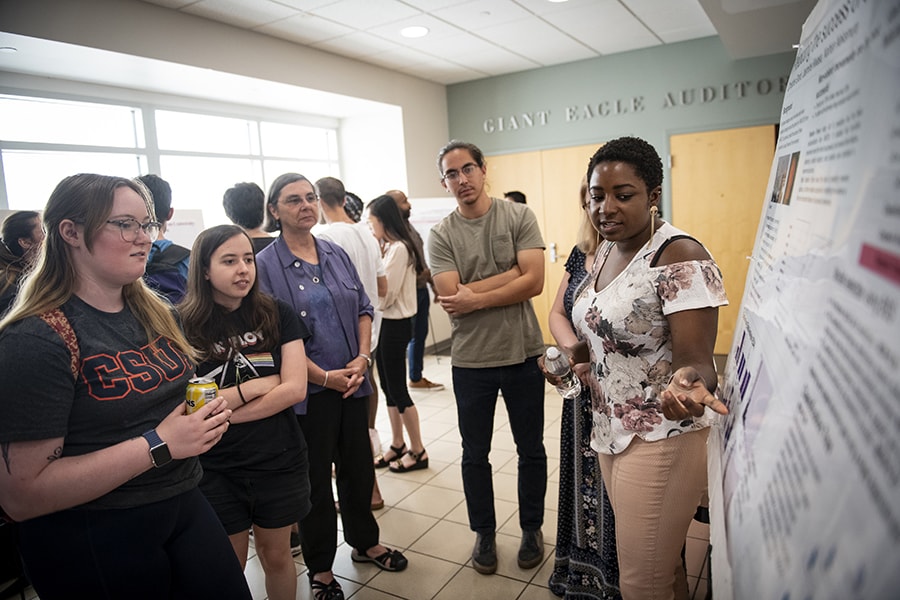
News Briefs
When Minorities Contribute, Group Members Listen
When women are outnumbered in team settings, they tend to contribute less often to the discussion. Yet ironically, according to new research from the Tepper School of Business, when women do participate, they wield more influence. The takeaway is that organizations that want to reap the benefits of diversity should encourage those contributions.
The paper, “Participation and Influence: The Countervailing Forces of Expertise Use in Diverse Groups,” published at Academy of Management Discoveries, studied over a hundred groups and was co-authored by Rosalind Chow and Anita Williams Woolley, associate professors of organizational behavior, and Tepper Ph.D. graduate Anna Mayo.
Woolley says the findings apply to both women and men if either gender is in the minority of a group. Both genders tend to get lost in the discussion because they participate less, even when they have relevant expertise, possibly because they assume they won’t be heard.
“But interestingly, if they do participate, and they have expertise, they are listened to — perhaps even more than those in the dominant group,” Woolley said. Find out more.
Research Identifies New Pathways for Sensory Learning in the Brain
We've all heard the saying that individuals learn at their own pace. Researchers at Carnegie Mellon have developed an automated, robotic training device that allows mice to learn at their leisure. The technology stands to further neuroscience research by allowing researchers to train animals under more natural conditions and identify mechanisms of circuit rewiring that occur during learning.
A research team led by CMU neuroscientist Alison Barth has used the automated technology to identify new, previously unidentified pathways activated when the brain rewires its circuits in response to experience. Their findings are published online in Neuron.
Barth's lab focuses on understanding the process by which cortical circuits receive sensory information and adapt to it in order to learn. Understanding the algorithm that underlies the changes in the brain's learning circuitry will have important implications for creating engineered systems that use deep learning and artificial intelligence. Find out more.
Graduate Students Across Campus Enhance Statistical Skills

More than 20 graduate students from across the university enhanced their statistical knowledge and skills through a pilot Statistical Learning Summer Workshop.
The Department of Statistics & Data Science, led by faculty members Peter Freeman, Joel Greenhouse and Rebecca Nugent, organized the workshop to introduce CMU graduate students outside of their department to best practices in statistical practice, from exploratory data analysis to using and interpreting various statistical learning algorithms. Graduate students Mikaela Meyer and Pratik Patil served as teaching assistants.
“When we initially proposed holding such a workshop, over 150 graduate students expressed interest in attending, and over 100 eventually applied to participate,” said Freeman, assistant teaching professor and associate director of undergraduate studies. “There is an obvious desire for statistics and data science education on this campus, and we hope to continue offering this workshop in the future. The students that we selected to participate in our first workshop come from a variety of backgrounds; a plurality are mechanical engineers, but we also have English and history and psychology students and more.” Find out more.
Do Electric Car Policies Really Reduce Carbon Emissions?
Jeremy Michalek, professor of engineering and public policy and mechanical engineering, has recently published a paper with EPP Professor Inês Azevedo and EPP alumnus Alan Jenn that analyzes federal and state policies on electric vehicles and if they really succeed in reducing carbon emissions.
The federal government’s policy incentivizes electric vehicle adoption by allowing automakers selling electric vehicles to follow relaxed emissions standards on their overall fleet (including gasoline and diesel-fueled cars). At the state level, California leads several states mandating that if automakers want to sell vehicles in the state, a certain portion of them must be electric.
Both policies encourage the development of new technologies and incentivize the sale of more electric vehicles, but they interact in a counterintuitive way, Michalek says. While the state policy pushes electric vehicles into the market, the federal policy gives automakers a break on emissions standards for traditional cars when more electric vehicles enter the market. This results in a “dirtier” overall fleet, according to Michalek, and leads to a peculiar situation: people indirectly increase emissions when they buy an electric car. Find out more.
Take Me Out to the Ballgame: CMU Night is Sept. 17

The fourth annual Carnegie Mellon Night at PNC Park is Tuesday, Sept. 17, when the Pirates host the Seattle Mariners at 7:05 p.m. Buy your tickets online — $23 for a corner box seat or $18 for a seat in the infield grandstand — and you’ll receive a free Pirates hat in CMU colors with the Carnegie Mellon wordmark on the side.
Prior to the game you can enjoy discounts on food and beverages from 5:30 – 7:30 p.m. in the concessions area behind sections 133-135.
